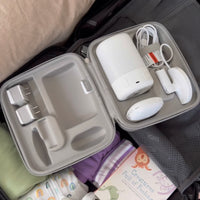Imagine if, after having a baby, you could travel back in time and coach yourself through the experience. What advice would you give yourself? What bits of wisdom would you pass along to deepen and ease the journey? Consider this story a time machine of sorts.
In our recent Parent Like a Pro Summit, we brought together three amazing experts and mamas who each have a wealth of experience and guidance to offer: Maristella Lucchini, Nanit’s Senior Clinical Researcher, Lexi Burtman, a physical therapist specializing in pelvic floor work, and Anushay Hossain, women’s health advocate and author of The Pain Gap.
In the webinar, they talked about what they wish they’d known before having kids and shared all their best tips whether you’re expecting a little one or are in the postpartum days. Here are some of our favorite takeaways.
Build up your strength.
Staying active can help make your pregnancy and delivery easier. “Throughout pregnancy as much as you can, work on staying strong and mobile,” advises Burtman. “As you get closer to the end of your pregnancy (the last three to four weeks), try to focus on relaxing your body and especially your pelvic floor muscles. Whether you are having a vaginal birth or a C-section, you want to practice controlling your body and breath. Deep breathing, calming your body, and working on mobility—especially in the hips—are all key. You can also practice being in different positions to prepare for delivery.”
Educate yourself pre-delivery.
The more you know about the delivery process, the more confident and capable you'll feel going into it. “The education component [of delivery] is huge,” says Burtman. “We should know going into birth what the options and tools are, the amount of time you might be in labor before a C section, what different pushing positions you might want to try, what the Labor and Delivery room looks like.” Write down a list of questions you and your partner have and ask your doctor. You can also schedule a tour of your hospital or birthing facility before your due date.
Have a birth plan…but know that it might change.
Once you have a stronger sense of the birth options, it’s a good idea to know ahead of time how you’d ideally like your baby’s birth to go. Think about details such as what kind of facility or setting you’d like, who will be present, what kind of support systems (medications, doula, birthing props) you’d ideally like to utilize.
But also, it’s hard to predict what will happen during the birth, so be prepared that plans could change and open yourself to alternatives. “Know about the different birth options/things that could happen,” recommends Burtman, “and think about what you want. But also talk through what you'd want if the birth doesn’t go according to plan and communicate that with your partner/doula/whoever else will be in the room. Consider things like if your doctor isn't the one delivering your baby, who would that person be. I've seen some parents have flow charts…if not this then this….”
Advocate for yourself.
You owe it to yourself to speak up for what you want and need. “Before we fix our culture and healthcare, unfortunately women have to advocate for themselves,” says Hossain. “I often see that women try to be the perfect patient, but hey, there are no wrong or dumb questions. It's your body! Ask your questions. You can speak up.”
And if you need confidence boosting at appointments or during delivery, “bring someone with you,” encourages Hossain. “A doula, partner, or friend, someone that you trust and that will back you up and speak up for you if you can’t do it yourself. The most important thing to know is that you have choices.”
Be kind to yourself–and what you expect of yourself–postpartum.
Don’t expect yourself to bounce back quickly after having a baby. “There's no such thing as bouncing back!” says Hossain. “It took nine months to grow this baby and your body has done so much.”
“Your whole body has changed,” adds Burtman. “And then you went through delivery which is a massive undertaking. Really acknowledge and give yourself some grace that you won't jump right back into [your pre-pregnancy self] and you need to treat your body gently and kindly.”
“With my first pregnancy, I thought I would just power through,” remembers Lucchini. “I thought, It's normal to have pain and struggle through it. Then, after delivery, I had to leave my baby at the NICU and I was going back and forth on the bus for three days. Nobody was giving me a seat and I didn't think to ask but my husband recommended I speak up. We assume that it’s normal to go through this pain without questioning it or looking out for ourselves.”
Have a postpartum plan.
Take steps to build up your support systems so they’re ready to go when your baby arrives. “Think about things like childcare,” suggests Hossain, “who can come and see the baby so you can get stuff done, sleep, shower…. Create your own village. Then food, it’s so important to be nourished. Make food and casseroles before you have the baby. Also, take all the disposable underwear from the hospital! Other cultures don't isolate pregnant women and mothers in the same way, so you really have to set yourself up for success.”
Part of your village should be people who can help your body heal. “Lactation support can be great,” suggests Lucchini. Burtman recommends: “Get pelvic floor PT! Even just one visit to go through how your body has changed and what your goals are. That early on can save you headaches and other issues down the line.”
Set boundaries.
Just as you advocate for yourself during pregnancy and delivery, it’s important to ask for what you need postpartum. “Speak up early on about what you will need,” says Lucchini, “and have the hard conversations (like ‘Mother in Law, I don't want you to come for a few weeks’). Be open about setting expectations so people know how to support you best, even if some of those conversations will initially be difficult.”
Postpartum anxiety and depression are real.
We sometimes focus primarily on getting help in the weeks right after birth—which is important. But it can be equally important to set up long-term support networks. “I wish somebody had told me that postpartum is forever,” says Hossain. “If you can get a therapist or a group of new moms, that can be really helpful. Talk to your mom friends and ask them what they wish they had known. And be real! We may not have had these conversations 10 or 15 years ago, but women are talking more, sharing their stories and experiences. You have to prioritize yourself. Your health is not an inconvenience and that includes your mental health.”
Wherever you are in your parenting journey, you deserve the best care you can get (and give yourself!). Our Parent Like a Pro summits are designed to be a part of your support network. And as you rally your village around you, don’t forget to include the Nanit Community as well.











































